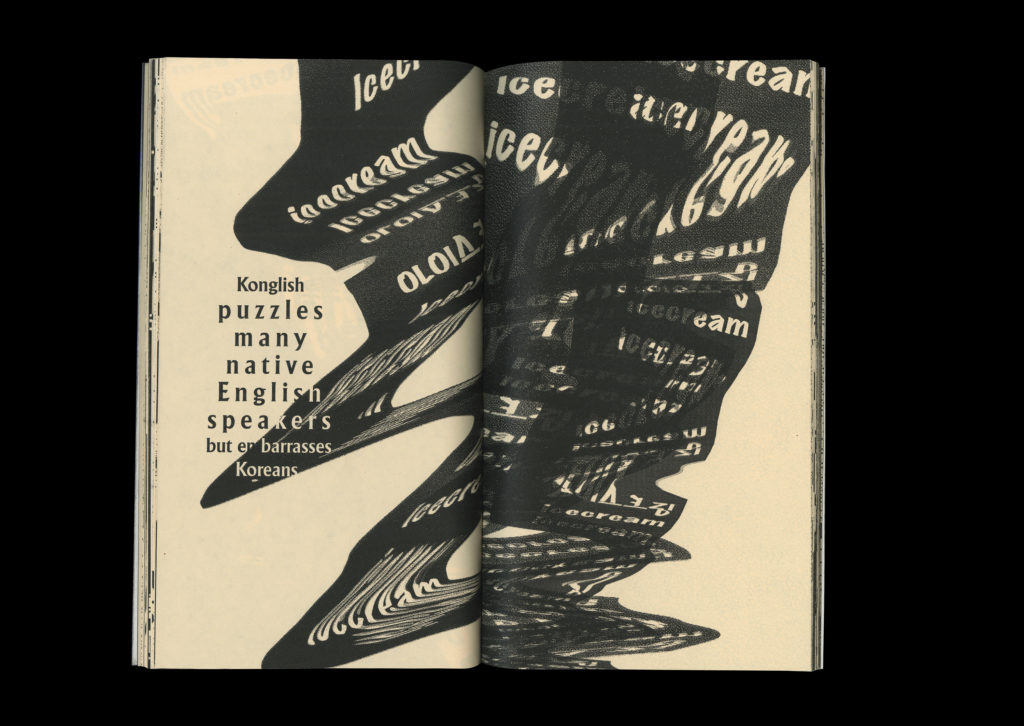Konglish, ch. 2
« previous post | next post »
A little over a year ago, we had our first look at "Konglish", Korean-style English. If it was thriving then, it seems to be positively luxuriant now:
"The Beauty and Perils of Konglish, the Korean-English Hybrid" (Margaret Rhodes, WIRED, 9/29/16)
This article describes a zine by Ran Park called "Lost in Konglish", which presents "the macaronic form of English sweeping through South Korea" as a kind of linguistic blend. According to Park, as a result of the prevalence of Konglish in her country, "we are losing our own language".
To that end, she designed “Lost in Konglish” to become less and less legible as you flip through it. She also created graphics of new letterforms that fuse the shape of Korean Hangul letters with English ones. The artful distortions and smudges grow more intense, until the text becomes indecipherable. “It becomes more chaotic, because the phenomenon is more serious,” she says. “There is communication missing.”
Here are a couple of relevant posts:
- "Is Korean diverging into two languages? " (11/6/14)
- "I.SEOUL.U " (11/15/15)
N.B.: "Konglish" must be distinguished from "Kongish " (8/6/15), the Chinglish of Hong Kong.
[h.t. Michael Carr]

Jim Breen said,
September 29, 2016 @ 10:29 pm
Interesting article, but surely it's going a bit far to call the adoption of loanwords "Konglish"? We don't regard words like aubergine or courgette as examples of Franglais. The use of "…ige" is a good example; in fact it's rather like the Japanese use of "…shon".
Using "manicure" for nail varnish quite possibly comes from Japanese. The loanword マニキュア (manikyua) has that as an alternative meaning.
Rodger C said,
September 30, 2016 @ 8:05 am
“keomp-yut-eo” ? Did some editor "correct" the syllabification?
MT Welles said,
September 30, 2016 @ 8:27 am
When I started teaching in Korea in the early 1990s, a time when many Koreans had not travelled abroad, students would often argue with me when I corrected them, saying that they had not made mistakes, but instead were speaking "Konglish", defined as "OUR (Korean) English".
Koreans separate "us" and "them" (우리 와 남), contrasting foreign things with Korean versions of them. Korean students at that time sometimes referred to the burger restaurant Lotteria as "Our McDonalds" and the resort island of Jeju was "Our Hawaii" when speaking with native English speakers.
In a way it kind of made sense that they would argue that Konglish was "our English", but as more people travelled overseas, they realized that they would have to learn more standard forms of English to communicate, and Konglish started to refer to the odder usages of English loanwords in Korean (by both teachers and students alike), like "consent" for an electrical outlet or "Dutch pay" for "going Dutch".
I don't know what Koreans say about Konglish among themselves,but in my interactions with students these days, they tell me that Konglish is the group of loanwords in Korean that may not have the same usages in English, like "handle" for "steering wheel".